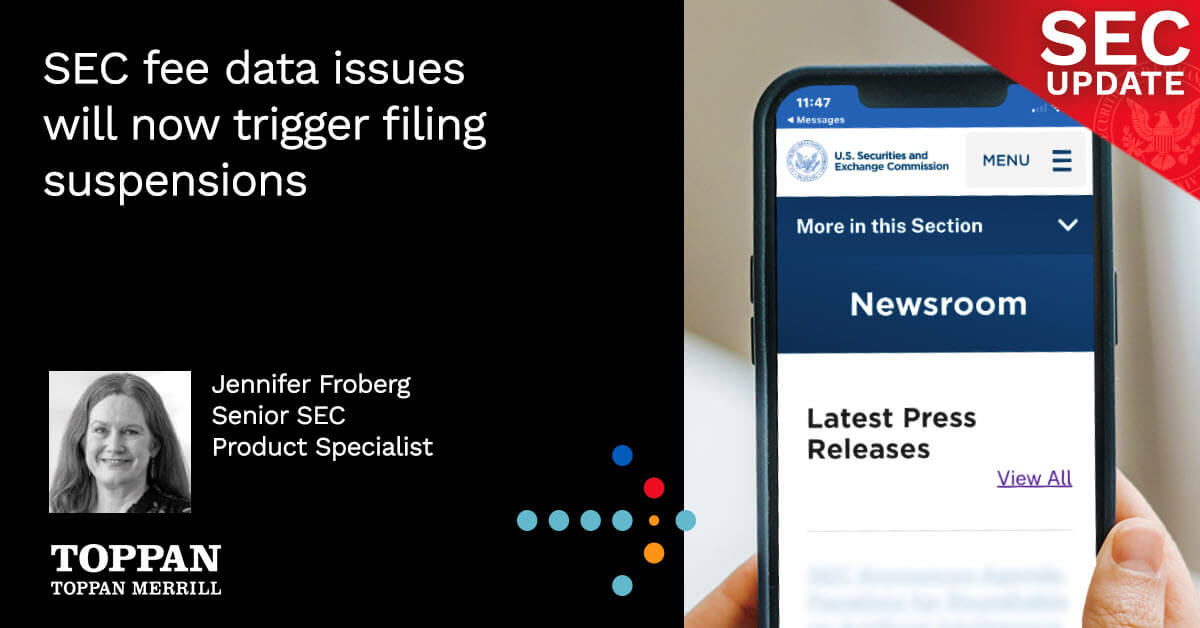A Securities and Exchange Commission (SEC) rule that takes effect on July 1, 2024, will require fund managers who file Form 13F reports to publicly report – on an annual basis on Form N-PX – the manner in which they vote on all pay-related proposals, which are advisory proposals presented by most public companies to their stockholders for consideration at stockholder meetings. The initial Form N-PX filings will be due August 31, 2024.
Pay-related proposals
There are three types of pay-related proposals covered by the new rule, as outlined below.
1. Advisory votes on executive compensation
Sometimes referred to as “say-on-pay” proposals, these allow stockholders to cast an advisory vote on the compensation paid to the company’s named executive officers. These votes generally are held annually at the company’s annual meeting of stockholders, but some companies hold them less frequently.
2. Advisory votes on frequency of executive compensation votes
Sometimes referred to as “say-on-frequency” proposals, these allow stockholders to cast an advisory vote on the frequency of say-on-pay votes. These proposals are required to be held at least once every six years and generally are held at the company’s annual meeting of stockholders.
3. Advisory votes on ‘golden parachute’ arrangements
Sometimes referred to as “say-on-parachute” proposals, these allow stockholders to cast an advisory vote on the compensation payable to a company’s named executive officers as a result of a change-in-control event (e.g., a merger or acquisition). These proposals generally only arise in connection with the vote on the change-in-control transaction.
Form N-PX disclosure requirements
Form N-PX will require Form 13F filers to disclose, on an issuer-by-issuer basis, the number of shares voted, and how they were voted on the pay-related proposal(s) submitted to stockholders (e.g., for, against or abstain or, in the case of say-on-frequency proposals, every one, two or three years). If Form 13F filers cast votes in multiple manners for a particular company (e.g., both for and against a proposal), they should report how many shares they voted in each manner. It is important to note that there is no de minimis exemption to reporting the manner of voting, meaning that Form 13F filers will be required to report all pay-related proposal votes regardless of the number of shares of the issuer’s stock they own or the fair market value of the shares. For Form 13F filers who engage in share lending, Form N-PX will require the Form 13F filer to report the number of shares they loaned out and did not recall for voting. For any Form 13F filers who have a disclosed policy of not voting proxies, and who did not in fact vote their shares during the relevant period, Form N-PX will include a designation box to indicate this fact.
Filing deadline
The new requirements go into effect on July 1, 2024, and Form 13F filers will be required to file their first reports on Form N-PX by August 31, 2024. The first report will cover all pay-related proposals presented at any stockholder meeting held between July 1, 2023, and June 30, 2024.
Only Form 13F filers who filed Form 13F during 2023 and 2024 will be required to file Form N-PX by August 31, 2024. For fund managers who have been subject to Form 13F filings only for a portion of the 2023 to 2024 time period, the SEC has provided transition guidance on the Form N-PX filing requirements, which we’ve outlined below.
Form 13F filers for 2024, but not 2023
Form 13F filers are not required to file a Form N-PX during the first calendar year in which their initial Form 13-F was required, so these fund managers will not be required to file Form N-PX until 2025.
Form 13F filers in prior years, but not during 2024
These fund managers are not required to file a Form N-PX this year, and they will not be required to file an initial Form 13F until the calendar year following their next required Form 13F filing.
Form 13F filers who cease filing Form 13F during 2024
Fund managers who currently file Form 13F but do not trigger a filing obligation for 2025 – i.e., those managers who do not advise funds owning an aggregate of $100 million of Section 13(f) securities as of the end of any calendar month of 2024 – will be required to file a “stub period” Form N-PX next year. That filing will cover all pay-related proposals presented at stockholder meetings held between July 1, 2024, and September 30, 2024, and will be due on March 1, 2025.
What to do now
Form 13F filers should begin tracking the annual meeting dates of their public portfolio companies, including determining whether pay-related proposals will be, or have been, presented. Similarly, Form 13F filers should monitor and record the manner of voting on pay-related proposals for all their public companies during the period covered by this filing requirement. Finally, Form 13F filers should begin to aggregate this information for provision to outside counsel who can assist in preparing the Form N-PX by the filing deadline.
Practical considerations
It is important that institutional investment fund managers recognize that their voting decisions on pay-related proposals now will be made public. Executive compensation matters recently have been the focus of heavy public criticism, so, to the extent there are sensitivities to the fund managers’ voting practices on these matters, they should consider whether and how these new requirements may impact their voting decisions.
Additionally, public companies generally are very sensitive to the degree of stockholder support that they receive on say-on-pay proposals. Companies that receive less than 80% support from stockholders on their say-on-pay proposals often undertake an investor outreach program to engage with their largest stockholders to seek feedback on their executive compensation programs. Accordingly, Form 13F filers should be mindful of the possibility of receiving outreach from management of these companies – and be prepared to engage in these discussions, particularly when their ownership position is relatively large (e.g., greater than 1%).
View source (for all formatting, tables, footnotes, etc) >>
Darren DeStefano primarily represents private and public corporate clients and investment banking firms with a particular emphasis on public securities matters. He has handled a variety of significant business transactions, including public and private equity offerings, high yield and convertible debt financings and mergers and acquisitions.
John Clendenin John is vice chair of Cooley’s global business department. His practice focuses on the representation of domestic and international investment funds – including venture capital, private equity, fund of funds, secondary funds, and special opportunity funds in connection with their formation, operation and investment activities.
Jordan Silber Jordan’s practice is concentrated on the formation and representation of private investment funds – primarily venture capital and growth equity funds – in the US, Greater Asia and Middle East/North Africa regions. Jordan also advises certain multinational enterprises, including Fortune 500 corporations, in their corporate venture capital funds, as well as institutions and family offices in their investment activities in venture capital funds.
John Dado John Dado is the head of the fund formation practice group. His practice is focused on the formation and operation of private equity firms, including venture capital funds, buy-out funds, fund of funds and investment advisory businesses.
Shane Goudey Shane Goudey specializes in all aspects of the formation and operation of domestic and international investment funds, including, venture capital, private equity, fund-of-funds, secondary market, debt and a variety of other types of funds.



